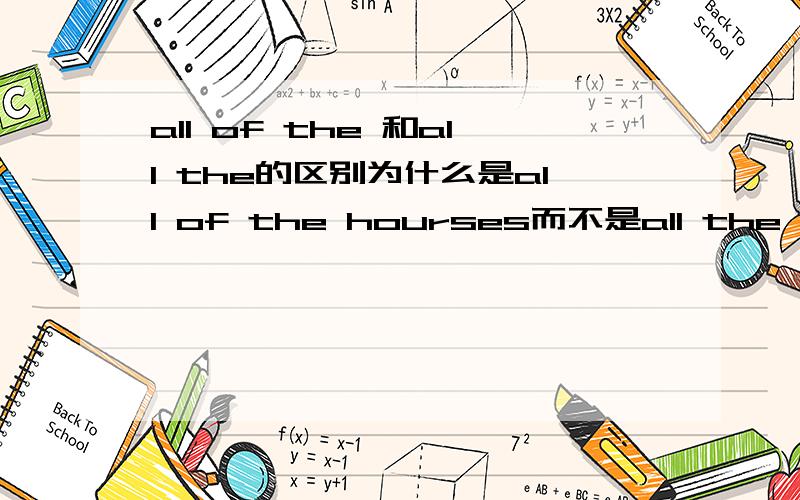all of the 和all the的区别为什么是all of the hourses而不是all the hourse呢?
来源:学生作业帮助网 编辑:作业帮 时间:2024/11/15 06:26:48

all of the 和all the的区别为什么是all of the hourses而不是all the hourse呢?
all of the 和all the的区别
为什么是all of the hourses而不是all the hourse呢?
all of the 和all the的区别为什么是all of the hourses而不是all the hourse呢?
all the+名词复数:表示"全部\所有"(没有范围)
all of the +名词复数:指在范围内的"全部\所有"
all 和 all of 的用法,有如下几点值得注意:
1. all 是“全部”、“都”的意思,具有名词和形容词功能。在代表或修饰表示数目在“三”以上的可数名词时,其后接复数动词;在代表或修饰不可数名词时,其后接单数动词。例如:
All of us are fond of swimming.
我们都喜欢游泳。
All the workers are working ...
全部展开
all 和 all of 的用法,有如下几点值得注意:
1. all 是“全部”、“都”的意思,具有名词和形容词功能。在代表或修饰表示数目在“三”以上的可数名词时,其后接复数动词;在代表或修饰不可数名词时,其后接单数动词。例如:
All of us are fond of swimming.
我们都喜欢游泳。
All the workers are working with great enthusiasm.
所有工人都在干劲十足地工作。
All of the food is good to eat.
所有的食品都好吃。
All the money is spent.
所有的钱都花光了。
试译:我们俩都喜欢乒乓球。
误:All of us like ping-pong.
正:Both of us like ping-pong.
2. all of 后可跟人称代词或有限定词修饰的名词。
All of us went.
我们全去了。
All of the students went.
全体学生都去了。
误:All of students went.
3. all of 后接跟限定词修饰的名词时,这 of 可以省略,意思不变。例如:
All (of) the students went.
全体学生都去了。
All (of) the food is good to eat.
所有这些食品都好吃。
all 直接修饰无限定词的名词时,表示“所有的”、“一切的”意思。例如:
All children want presents on their birthdays.
所有的孩子生日时都想得到礼物。
Not all food is goot to eat.
并不是所有的食物都好吃。
4. all 和 not 连用表示部分否定,不作“全部不”、“都不”解。例如:
All the students of the college do not come from the countryside.
这个学院的学生并非全部来自农村。
All the teachers do not live in this street.
老师们并不是个个都住在这条街上。
I don't know all of them.
我对他们并不是个个都认识。
表示全部否定应用 none。
5. all 可以用于句子主语之后,注意它在句中的位置:
(1) 放在由一个词构成的简单动词之前:
We all like ping-pong.
我们都喜欢打乒乓球。
(2) 如果有助动词,放在第一个助动词之后:
They have all gone.
他们都走了。
(3) 放在动词 be 之后:
The delegates are all present.
代表们都出席了。
We are all tired.
我们都累了。
all 可以放在宾语之后,这宾语必须是人称代词。例如:
正:I have eaten them all.
我们都吃光了。
误:I have eaten the cakes all.
收起